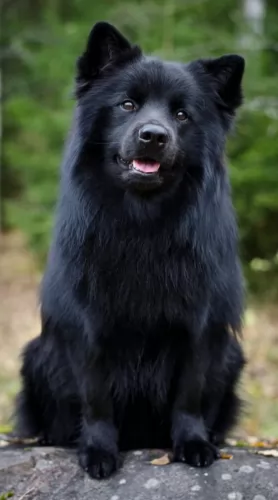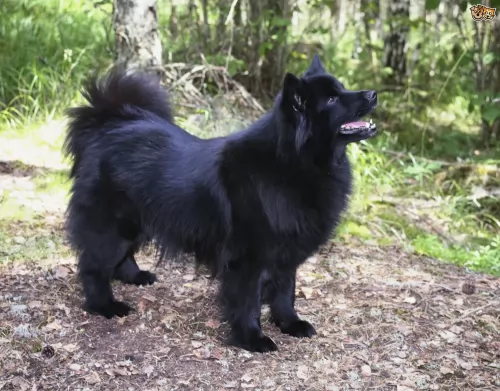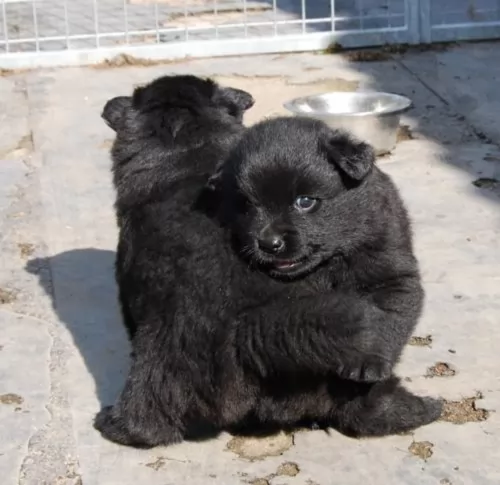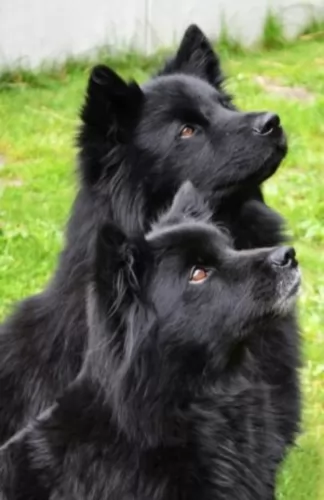 Petzlover
Petzlover Red Heeler is originated from Australia but Swedish Lapphund is originated from Sweden. Both Red Heeler and Swedish Lapphund are of same height. Both Red Heeler and Swedish Lapphund are having almost same weight. Both Red Heeler and Swedish Lapphund has almost same life span. Both Red Heeler and Swedish Lapphund has same litter size. Red Heeler requires Low Maintenance. But Swedish Lapphund requires Moderate Maintenance
Red Heeler is originated from Australia but Swedish Lapphund is originated from Sweden. Both Red Heeler and Swedish Lapphund are of same height. Both Red Heeler and Swedish Lapphund are having almost same weight. Both Red Heeler and Swedish Lapphund has almost same life span. Both Red Heeler and Swedish Lapphund has same litter size. Red Heeler requires Low Maintenance. But Swedish Lapphund requires Moderate Maintenance
 Known also as the Australian Cattle Dog, the Red Heeler is also known as the Blue Heeler. This is a breed of herding dog originally developed in Australia.
Known also as the Australian Cattle Dog, the Red Heeler is also known as the Blue Heeler. This is a breed of herding dog originally developed in Australia.
These dogs are known for their stamina and resilience with driving cattle over long distances in hot weather and across rough terrain.
It was George Eliott who developed the Red Heeler – crossing native Dingoes with Collies and other herding dogs.
In America, the breed was fully recognised in September 1980.
 This is a Spitz type of dog from Sweden. It is Sweden’s national dog.The dog has always been used for herding and guarding livestock such as reindeer for the Sami people.
This is a Spitz type of dog from Sweden. It is Sweden’s national dog.The dog has always been used for herding and guarding livestock such as reindeer for the Sami people.
The dog is much the same as the Finnish Lapphund, and some even believe that it might be one and the same. The American Kennel Club recognizes them as two separate breeds.
It is one of the oldest Swedish dog breeds and also one of 3 Lapphund breeds.The Swedish Kennel Club recognized the Lapphund as a distinct breed in 1903.
The Federation Cynologique Internationale recognized this dog in 1944, and the United Kennel Club in 2006.
 The Red Heeler is a medium-sized dog standing at between 43 to 51 cm in height and weighing in the region of 14 – 16 kg.
The Red Heeler is a medium-sized dog standing at between 43 to 51 cm in height and weighing in the region of 14 – 16 kg.
He is muscular, with a sturdy build. The coat of this robust dog is shortish and thick and quite often you’ll find a white star marking on he forehead. The coat is a blue-grey color or reddish. The tail of this dog is long and the ears are erect.
The Red Heeler has always been a working dog so he is energetic and lively, being independent and strong-willed.
He is super intelligent too and can be easily trained and socialized. He is a dog that simply loves the outdoors and if you don’t live on a farm, he is going to need lots of exercise.
He gets on well with kids and other pets, but children should be taught to respect him and be kind towards him, otherwise he might not tolerate them. He is a loyal, protective dog, wanting to ensure the safety of his human family.
 The Swedish Lapphund is a medium to large sized dog standing at between 40 to 51cm in height and weighing between 19 and 21kg.
The Swedish Lapphund is a medium to large sized dog standing at between 40 to 51cm in height and weighing between 19 and 21kg.
The head is wedge shaped and the ears erect. He has a thick double coat with fairly straight, silky hair that stands out from the body. Colors can be brown or black and sometimes there can be white markings. He sheds quite a bit, with some heavier seasonal shedding.
When you get one of these Spitz type dogs as your pet, you can be sure that you’re going to have an excellent pet and companion.
They’re independent dogs with strong wills and like to do their own thing. Training and socialization can change that and make him easy, well mannered and obedient.
They’re lively dogs and intelligent too. He is versatile, loving to be outdoors and being energetic with the children but being able to enjoy some quiet time indoors too. He is simply an excellent family pet and watchdog.
 When you bring a Red Heeler into your home, you must know that you’re never going to have a dull moment. They’re not content to lie around with nothing to do. These popular dogs literally coax you to come out and to be active.
When you bring a Red Heeler into your home, you must know that you’re never going to have a dull moment. They’re not content to lie around with nothing to do. These popular dogs literally coax you to come out and to be active.
Red Heelers need lots of activities and lots of room, so they aren’t particularly suited to life in the city. Large properties and plenty to do is what they ask for.
Your Red Heeler is going to make a splendid pet, loyal and devoted, the perfect example of man’s best friend.
 The Swedish Lapphund has always been a hardworking dog, herding reindeer for the Sami people.
The Swedish Lapphund has always been a hardworking dog, herding reindeer for the Sami people.
Today the Lapphund is a people-loving dog and wants to be constantly with his human family. He is intelligent, strong, independent, loyal, bold and loving. If you’re looking for an excellent family companion, this is it.
Do him a favor and don’t leave him outside without human companionship as he will become run-down and possibly destructive through no fault of his own. Bring him into your family and make him part of it and then he’s happy.
 Your Red Heeler can live to be 15 years of age with good care. Every dog however, can fall prey to some of the many common dog diseases there are, some of which can be -
Your Red Heeler can live to be 15 years of age with good care. Every dog however, can fall prey to some of the many common dog diseases there are, some of which can be -
There are quite a lot of congenital and inherited musculoskeletal disorders in dogs, with some of the more common ones being hip dysplasia and muscular dystrophy for instance.
There are some of these musculosceletal problems which can be fatal. Some of the typical symptoms you’ll see with these problems are difficulty climbing stairs or jumping, loss of muscle mass in the hind limbs, arthritis and lameness.
The retina of the eye is that light-sensitive part and which is part of the central nervous system. With retinal degeneration, the cells decline, leading to impaired vision and sometimes even blindness.
Some symptoms to look out for include dilated pupils, night blindness and the inability to see clearly in bright light. The disease worsens over times with sudden blindness being quite common with older dogs. Your vet will want a thorough history of your dog’s health.
Other dog diseases to be very aware of are cancer, obesity, bloat, hip dysplasia and epilepsy.
 The Swedish Lapphud is a healthy dog breed, but even so he can get one of the many common dog illnesses there are.If you choose a puppy, make sure to get your pet from a reputable breeder to avoid more serious dog illnesses.
The Swedish Lapphud is a healthy dog breed, but even so he can get one of the many common dog illnesses there are.If you choose a puppy, make sure to get your pet from a reputable breeder to avoid more serious dog illnesses.
Diabetes Mellitus is a disease you might have to watch out for with this dog breed.
This is a disease of the pancreas. This organ has two groups of cells – one produces enzymes for proper digestion and the other produces the hormone insulin which regulates the level of glucose in the bloodstream.
Diabetes is when the pancreas fails to regulate blood sugar. Your dog will have increased thirst and urination, weight loss, and increased appetite.
Type I diabetes mellitus results from destruction of the insulin-producing beta cells, which is the most common type of diabetes in dogs. Dogs with this type of diabetes require insulin injections to stabilize blood sugar. Type II diabetes is more likely in older, obese dogs.
Dogs with diabetes mellitus will require insulin each day. If canine diabetes mellitus is properly regulated, prognosis for the dog is good.
 The Red Heeler is an active dog, and apart from walks which will give him the chance to sniff around, he will need lots of other forms of exercise. Rope pulling games he’ll love and running after a ball will please him because it takes him back to days when he used to run around and herd livestock.
The Red Heeler is an active dog, and apart from walks which will give him the chance to sniff around, he will need lots of other forms of exercise. Rope pulling games he’ll love and running after a ball will please him because it takes him back to days when he used to run around and herd livestock.
If you’re an outdoorsy type of person who loves hiking in the wilds and swimming in rivers, you can count this dog in.
You can look at the Red Heeler as a low maintenance dog. He does shed, but a good brush of the coat twice a week will be excellent for him. If he doesn’t wear his nails down naturally, you will need to trim them. Also, while you are brushing him, check his ears and eyes and inside his mouth to make sure he is clear of all infections.
Red Heelers rely on good food for their resilience and stamina, and for convenience it is good to have commercially manufactured dog food as a backup. The best is home-made food which is easy to prepare and totally uncomplicated.
Simply add into one big pot chicken, brown rice or pasta and spinach, sweet potatoes and carrots. This food can all be chopped up, refrigerated and added warmed up and in small portions to your pet's dry kibble once or twice a week. Simple and tasty, your Red Heeler will love it and thrive on it too.
Ensure there is always a bowl of fresh, cool water within his reach.
 ●The Swedish Lapphund is an active dog and will require a high quality dog food. If you buy commercially manufactured dog food it should be appropriate to your dog’s age and activity levels.
●The Swedish Lapphund is an active dog and will require a high quality dog food. If you buy commercially manufactured dog food it should be appropriate to your dog’s age and activity levels.
Home-made food like boiled chicken, brown rice, spinach and sweet potatoes will do your pet the world of good, and chopped up, it can be added a couple of times a week to the dog’s dry kibble.
Try and feed some raw met occasionally as well. Clean, fresh water should be available at all times.
●The Lapphund is an active dog and he is going to reguire daily exercise that will keep him mentally and physically fit. Having a dog like this requires you being active yourself, and your Lapphund is going to love going on long walks or hikes. He will never get enough games with the children – he just loves the rough and tumble.
● Have his vaccines attended to. There are training classes as well as boarding kennels that won’t accept your dog unless his vaccines are up to date.
● Have your dog spayed or neutered if you don’t want your dogs to have puppies.
● Brush his coat twice a week. Check inside his ears and inside his mouth for redness and infection.